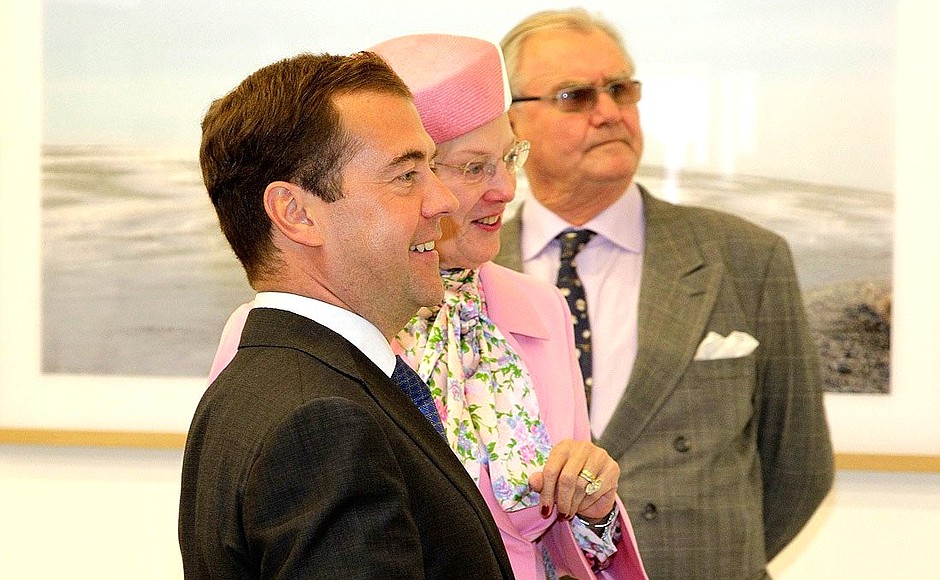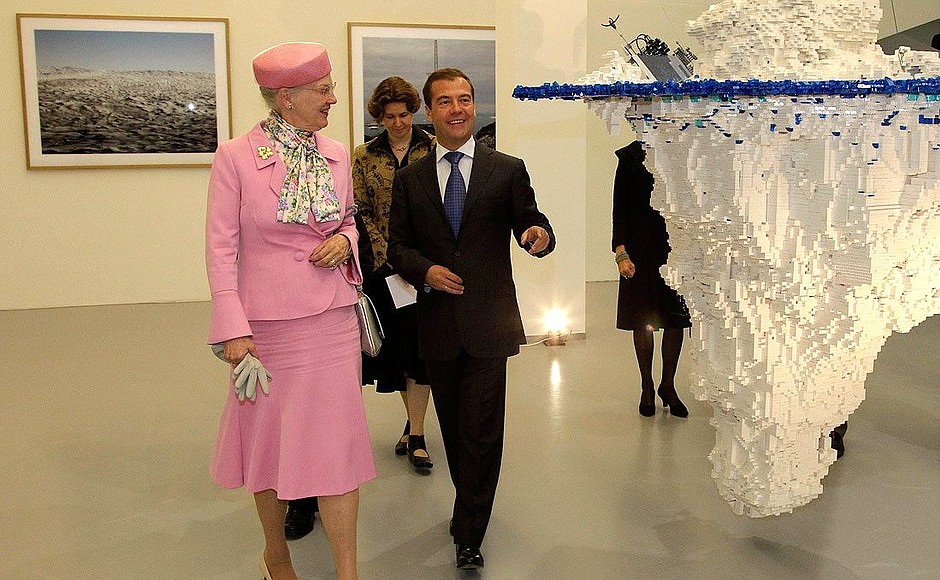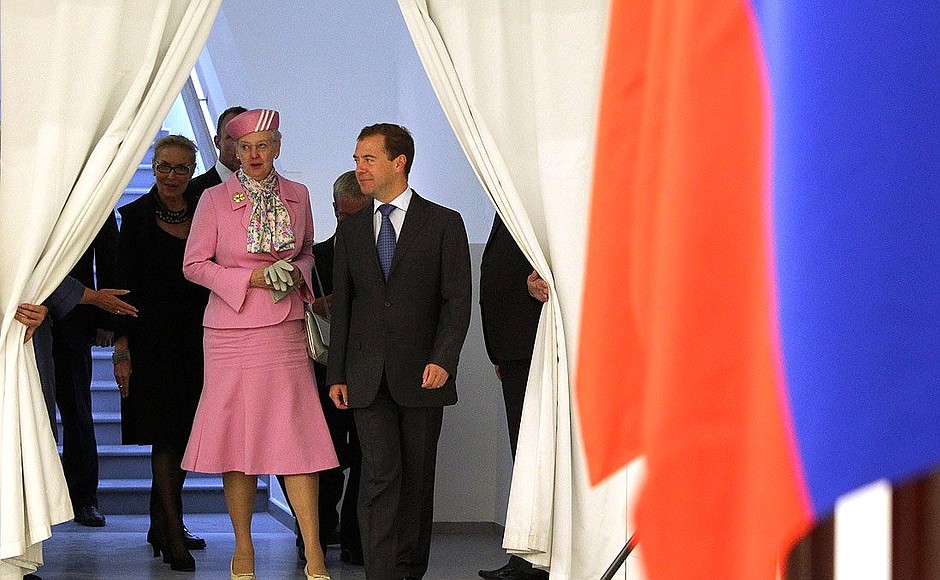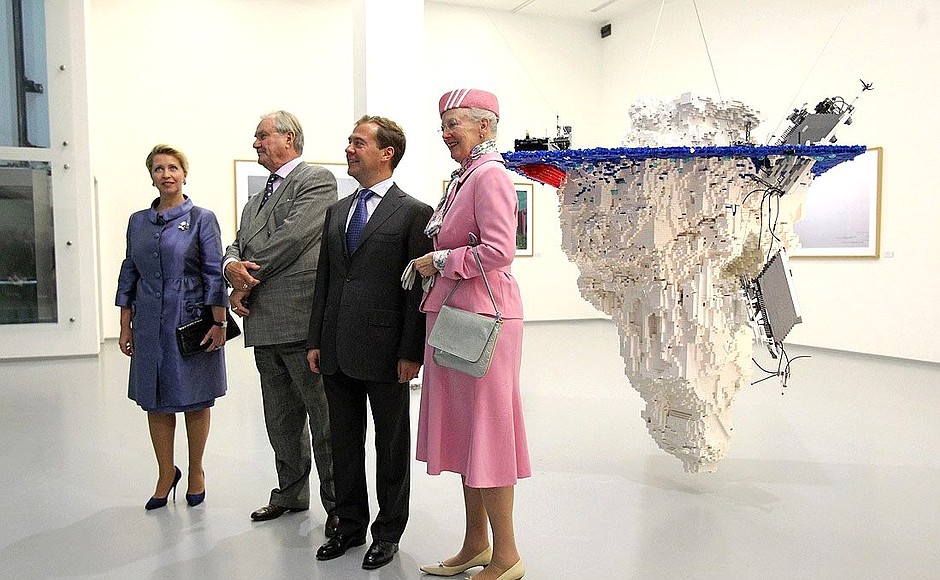* * *
President of Russia Dmitry Medvedev: Your Majesty, Your Highness, ladies and gentlemen,
I am very pleased that we are meeting here today at this museum of photography and modern art, and that what has brought us here is the opening of this exhibition dedicated to one of the most beautiful parts of our planet – the Arctic.
The exhibition showcases photographs by Danish and Russian photographers. We have yet to see them, but I am sure they are all very interesting.
Denmark and Russia are both Arctic countries, and for us the Arctic is not some abstract geographical notion, something far away and not very clear, but is something that is part of our everyday concerns. It is a harsh region, but very important for the development of our countries and of other countries and their peoples.
Our countries are members of the Arctic Council and work together on an ongoing basis within this council. This is very important, and I am sure that we will continue our responsible behaviour in the future, given that the Arctic is not just one of our current concerns, but is also part of the legacy that we have a duty to hand down in good condition to future generations. As I understand, part of the exhibition we are about to see deals with exactly this issue.
We all know now that the planet’s climate is changing. Some see in this a threat to the future of human civilisation, while others see new opportunities that we could make use of. Others again think the threat has been exaggerated. I think that one thing is obvious today, and that is that climate change is a real and happening trend, and it is something we have discussed at a wide variety of forums, from meetings of experts to G20 summits. I think it is indeed very important that we give this issue our attention.
The photographs on display capture the Arctic as it is at a particular day and moment, and in one sense are objective portraits, while at the same time providing an emotion-filled account of what is happening in this harsh but beautiful region.
I want to thank Her Majesty for this chance to open this exhibition together today. This is a good event. It is a symbolic event within the context of the state visit that Her Majesty is making to Russia at the moment, and it is indeed a symbol of our duty to look after and cherish the Arctic and cooperate on this together.
I wish the exhibition many keen visitors and hope it will leave everyone with fine impressions. Thank you.
Her Majesty Queen Margrethe II of Denmark: (re-translated): Mr President, Mrs Medvedeva,
In 1725, Peter the Great appointed Danish navigator Vitus Bering to head the first Kamchatka expedition. Bering’s task during the expedition was to study and chart the Russian Empire’s easternmost reaches. In particular, Bering was to ascertain whether the Russian Empire’s eastern reaches were linked by land to North America. The expedition lasted until 1730. In 1733, Bering again left for the east, this time to chart the Russian Empire’s Arctic Sea coast. In July 1741, Bering reached Alaska, looked for the coast, but was shipwrecked while returning from Alaska and died on Bering Island, far from his native Denmark. His memory is honoured and remembered today in both Denmark and Russia. You could say that Vitus Bering’s work was our first joint project in the Arctic.
The Arctic is important not just from a scientific and economic point of view, but also because the world’s northern reaches are a great source of artistic inspiration. Today’s exhibition offers some examples. Four Russian and four Danish photographers present their works here. The artists include a photographer from Greenland who was born in Latvia, but then went to Greenland and stayed there.
Today’s exhibition is an excellent example of the kind of art that takes its precious inspiration from the Arctic world. The camera lens captures that which the artist’s eye selects, that which the photographer chooses to show us, so that we can admire and wonder at just what nature and that light that shines in the northern regions can do.
I hope the exhibition will draw many visitors and that it will succeed in sharing what has us so enraptured. Certainly, I personally, my husband, Prince Consort Henrik, and our son, Crown Prince Frederik, feel this rapture.
With these words, I declare the exhibition open.



